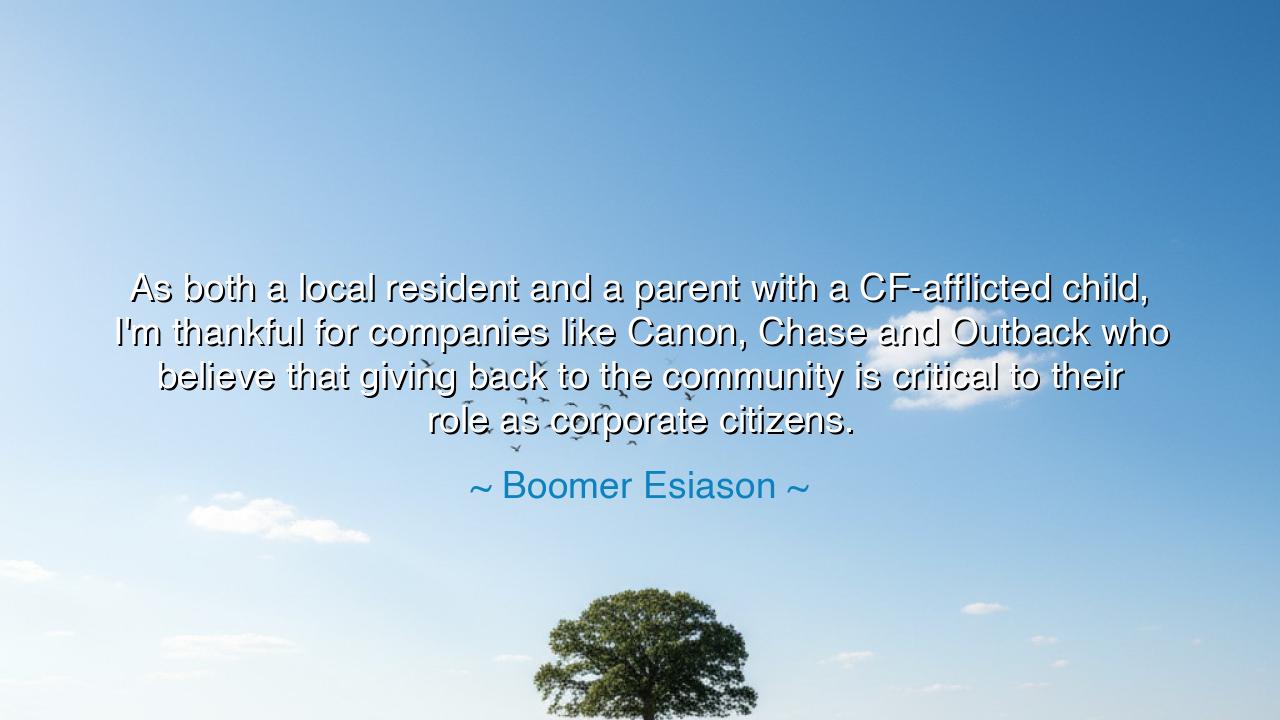
As both a local resident and a parent with a CF-afflicted child
As both a local resident and a parent with a CF-afflicted child, I'm thankful for companies like Canon, Chase and Outback who believe that giving back to the community is critical to their role as corporate citizens.






When Boomer Esiason declares, “As both a local resident and a parent with a CF-afflicted child, I’m thankful for companies like Canon, Chase and Outback who believe that giving back to the community is critical to their role as corporate citizens,” he speaks as one whose gratitude has been shaped not only by his public life as an athlete, but by his private battles as a father. His words are not the light thanks of one acknowledging charity at a distance; they are the deep thanksgiving of a man whose family has felt the direct weight of illness and the sustaining power of compassion. In this balance of personal struggle and public recognition, Esiason reveals a profound truth: that greatness in business, as in life, is not measured by profit alone, but by the willingness to give back to the community that sustains you.
The origin of this gratitude lies in Esiason’s own journey as the parent of a child living with cystic fibrosis. This disease, merciless and demanding, brought him face to face with the fragility of life and the constant need for research, care, and support. In such a battle, no family can stand alone. Thus, when corporations choose to act not merely as businesses but as citizens, taking responsibility for the communities in which they thrive, their generosity becomes a lifeline. Esiason’s thankfulness is therefore deeply personal—rooted in the recognition that such contributions are not abstract, but profoundly human, touching the lives of real families in moments of struggle.
History, too, has seen the nobility of those who use their power and resources for the sake of the many. Consider Marcus Aurelius, the philosopher-king of Rome. Though burdened with the rule of an empire, he declared that the wealth and strength of leaders exist not for personal indulgence, but for the care of the people. He reminded himself daily: “What brings no benefit to the hive brings none to the bee.” Likewise, corporations that thrive while ignoring their communities are barren hives, but those that give back create sustenance for all. Esiason’s praise of Canon, Chase, and Outback echoes this ancient truth—that prosperity must be shared if it is to endure.
There is humility in his thankfulness, for though he once stood on the fields of sport, commanding the roar of crowds, he acknowledges that in the arena of illness, he is like any other parent: dependent on the kindness, generosity, and commitment of others. His gratitude for these companies is also gratitude for a principle—that wealth carries responsibility, that influence must be wielded not only for gain but for good. This humility is a powerful reminder that no individual, no matter how great, can stand apart from the fabric of community.
His words also contain a warning for future generations: that corporate citizenship is not optional, but essential. In an age where businesses can grow vast and powerful, detaching themselves from the people they serve, the call to give back is a call to remain human. Those who forget this risk losing not only their moral compass but also the loyalty and trust of the very communities that sustain them. Gratitude for corporate generosity must therefore be matched by vigilance, ensuring that such acts of giving remain central to their mission.
The lesson for us is profound: whether as individuals or corporations, we are bound by duty to one another. Wealth, power, and influence are not ends in themselves; they are tools to be used in service of the greater good. To be thankful for generosity is to recognize its value, but to live wisely is to imitate it. Each of us, in our own measure, is called to be a citizen not only of our household, but of our community, giving back according to what we have received.
Practical wisdom follows. As individuals, we can give back through acts of service, support for local causes, and the offering of our time and skills. As organizations, we can adopt the mindset that success is incomplete without social responsibility. And as communities, we can honor and encourage those who give generously, ensuring that such acts are not forgotten but inspire others to do likewise. Above all, we must remember that true greatness lies not in accumulation, but in contribution.
Thus, in the words of Boomer Esiason, we hear the enduring truth: that gratitude and generosity are the twin pillars of a just society. To be thankful for those who give back is to acknowledge the sacred bond between wealth and duty, power and responsibility. Let us then live in such a way that our own legacies, whether great or small, are marked not by what we kept, but by what we gave.






AAdministratorAdministrator
Welcome, honored guests. Please leave a comment, we will respond soon